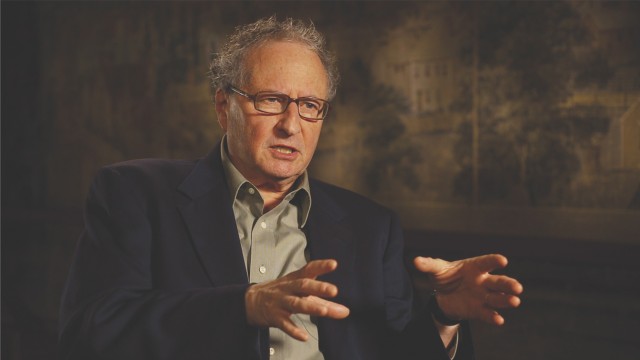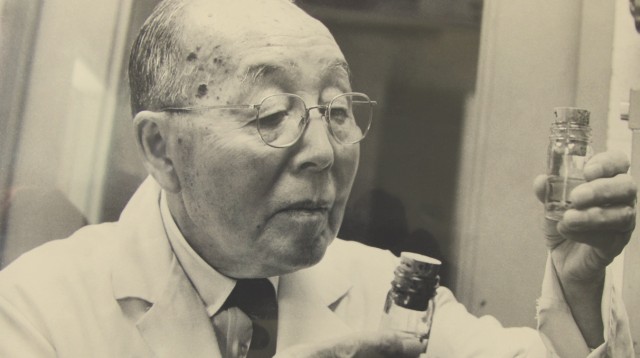
Science writer Dr. Ralph W. Moss tells the fascinating story of the battle over Laetrile in the 1970s in SECOND OPINION
SECOND OPINION (Eric Merola, 2014)
Cinema Village
22 East 12th St. between University Pl. & Fifth Ave.
Opens Friday, August 29
212-529-6799
www.secondopinionfilm.com
www.cinemavillage.com
 At the beginning of Eric Merola’s Second Opinion: Laetrile at Sloan-Kettering, a 1970s news reporter says, “Dr. Robert Good, president of the Sloan Kettering Institute, one of the world’s biggest and richest cancer research centers, said Laetrile does not prevent cancer, nor cure cancer, nor stop cancer from spreading.” For the next seventy-five minutes, Ralph W. Moss, PhD, the public affairs science writer for the Memorial Sloan Kettering Cancer Center from 1974 to 1977, talks about what lay behind that statement and the furor that followed. He tells the captivating story of what went on behind the scenes as Laetrile, a form of amygdalin used in tumor treatment, was coveted by cancer patients but demonized by the medical establishment. The controversy over the drug, which was eventually banned in America, forced patients to go to Mexico in search of the palliative care medicine while the FDA, the National Cancer Institute, and several high-profile MSK doctors considered it to be quackery. MSK’s own top researcher, Dr. Kanematsu Sugiura, had exciting success treating mice with the drug, hopeful that the positive effects would be proven in humans as well. But when Dr. Good, MSK vice presidents Dr. Lloyd J. Old and Dr. Chester Stock, and MSKCC president Dr. Lewis Thomas decided that Laetrile was not the future of cancer treatment, despite what some of them had previously stated in public, Moss was confused and distressed. Others were as well; the documentary reveals that the political dimension of the debate eventually brought even the ultra-right-wing John Birch Society into the fray. Moss eventually became a whistleblower, writing numerous books on the subject, including The Cancer Industry, Cancer Therapy: The Independent Consumer’s Guide to Non-Toxic Treatment & Prevention, and the brand-new Doctored Results: The Suppression of Laetrile at Sloan-Kettering Institute for Cancer Research, which spurred the documentary.
At the beginning of Eric Merola’s Second Opinion: Laetrile at Sloan-Kettering, a 1970s news reporter says, “Dr. Robert Good, president of the Sloan Kettering Institute, one of the world’s biggest and richest cancer research centers, said Laetrile does not prevent cancer, nor cure cancer, nor stop cancer from spreading.” For the next seventy-five minutes, Ralph W. Moss, PhD, the public affairs science writer for the Memorial Sloan Kettering Cancer Center from 1974 to 1977, talks about what lay behind that statement and the furor that followed. He tells the captivating story of what went on behind the scenes as Laetrile, a form of amygdalin used in tumor treatment, was coveted by cancer patients but demonized by the medical establishment. The controversy over the drug, which was eventually banned in America, forced patients to go to Mexico in search of the palliative care medicine while the FDA, the National Cancer Institute, and several high-profile MSK doctors considered it to be quackery. MSK’s own top researcher, Dr. Kanematsu Sugiura, had exciting success treating mice with the drug, hopeful that the positive effects would be proven in humans as well. But when Dr. Good, MSK vice presidents Dr. Lloyd J. Old and Dr. Chester Stock, and MSKCC president Dr. Lewis Thomas decided that Laetrile was not the future of cancer treatment, despite what some of them had previously stated in public, Moss was confused and distressed. Others were as well; the documentary reveals that the political dimension of the debate eventually brought even the ultra-right-wing John Birch Society into the fray. Moss eventually became a whistleblower, writing numerous books on the subject, including The Cancer Industry, Cancer Therapy: The Independent Consumer’s Guide to Non-Toxic Treatment & Prevention, and the brand-new Doctored Results: The Suppression of Laetrile at Sloan-Kettering Institute for Cancer Research, which spurred the documentary.
Writer, director, producer, and coeditor Merola (Burzynski) lets Moss share his tale while sitting in a chair in the middle of a room at the Aldrich House in Providence, an odd if somewhat comforting choice, supplemented by archival footage and brief comments from Moss’s wife, Martha, son, Ben, and daughter, Melissa, in addition to Dr. Alex Pruchnicki, the only medical professional to come out in support of Moss without being anonymous. Merola also often cuts between two cameras, one a disorienting shot that shows the subject from the side, as if he had to try something different since the film is mostly talking heads. It’s quite an amazing story, and one that continues today, as labs around the world test and question the effectiveness of Laetrile. But watching Second Opinion, it’s hard not to wonder just what might have happened had MSKCC allowed Dr. Sugiura’s research to go on and the government given the drug more of a chance. The film is playing at Cinema Village, with Merola and Dr. Moss participating in Q&As following several screenings over the weekend, concluding with the 3:10 showing on August 31.
